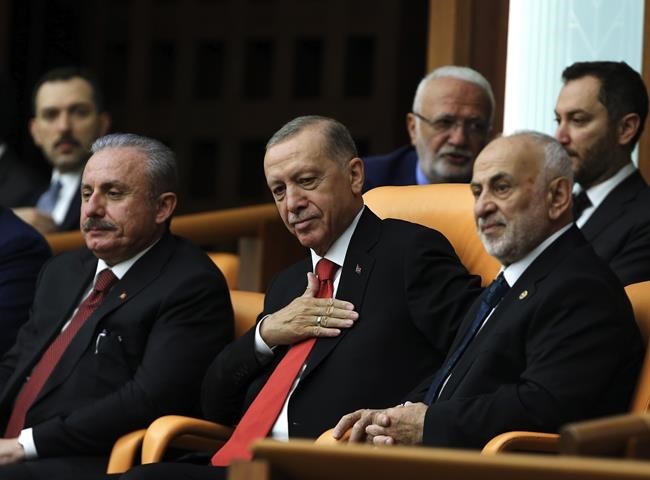ANKARA, Turkey (AP) — Turkey’s longtime leader, Recep Tayyip Erdogan, took the oath of office on Saturday, ushering in his third presidential term that followed three stints as prime minister.
Erdogan, 69, won a new five-year term in a runoff presidential race last week that could stretch his 20-year rule in the key NATO country that straddles Europe and Asia into a quarter-century. The country of 85 million controls NATO’s second-largest army, hosts millions of refugees and played a crucial role in brokering a deal that allowed the shipment of Ukraine grain, averting a global food crisis.
Erdogan was sworn in during a session in parliament before an inauguration ceremony at his sprawling palace complex. Supporters waited outside parliament despite the heavy rain, covering his car with red carnations as he arrived.
All eyes are on the announcement of his new Cabinet later on Saturday. Its lineup should indicate whether there will be a continuation of unorthodox economic policies or a return to more conventional ones amid a cost-of-living crisis.
Dozens of foreign dignitaries are traveling to attend the ceremony, including NATO Secretary General Jens Stoltenberg and Carl Bildt, a high-profile former Swedish prime minister. They are expected to press Erdogan to lift his country’s objections to Sweden’s membership in the military alliance — which requires unanimous approval by all allies.
Turkey accuses Sweden of being too soft on Kurdish militants and other groups that Turkey considers to be terrorists. NATO wants to bring Sweden into the alliance by the time allied leaders meet in Lithuania on July 11-12, but Turkey and Hungary have yet to endorse the bid. Hungarian Prime Minister Viktor Orban will also be attending the ceremony.
According to state-run Anadolu Agency, other leaders in attendance include Azerbaijan’s Ilham Aliyev, Venezuela’s Nicolas Maduro, South Africa’s Cyril Ramaphosa, Armenia’s Nikol Pashinyan, Pakistan’s Shahbaz Sharif, and Libya’s Abdul Hamid Dbeibah.
Erdogan was sworn in amid a host of domestic challenges ahead, including a battered economy, pressure for the repatriation of millions of Syrian refugees and the need to rebuild after a devastating earthquake in February that killed 50,000 and leveled entire cities in the south of the country.
Turkey is grappling with a cost-of-living crisis fueled by inflation that peaked at a staggering 85% in October before easing to 44% last month. The Turkish currency has lost more than 10% of its value against the dollar since the start of the year.
Critics blame the turmoil on Erdogan’s policy of lowering interest rates to promote growth, which runs contrary to conventional economic thinking that calls for raising rates to combat inflation.
Unconfirmed media reports say Erdogan plans to reappoint Mehmet Simsek, a respected former finance minister and deputy prime minister, to the helm of the economy. The move would signify a return by the country — which is the world’s 19th largest economy according to the World Bank — to more orthodox economic policies.
In power as prime minister and then as president since 2003, Erdogan is already Turkey’s longest-serving leader. He has solidified his rule through constitutional changes that transformed Turkey’s presidency from a largely ceremonial role to a powerful office. Critics say his second decade in office was marred by sharp democratic backsliding including the erosion of institutions such as the media and judiciary and the jailing of opponents and critics.
Erdogan defeated opposition challenger Kemal Kilicdaroglu in a runoff vote held on May 28, after he narrowly failed to secure an outright victory in a first round of voting on May 14. Kilicdaroglu had promised to put Turkey on a more democratic path and improve relations with the West. International observers deemed the elections to be free but not fair.
___
Kiper reported from Bodrum, Turkey.
Suzan Fraser And Cinar Kiper, The Associated Press

